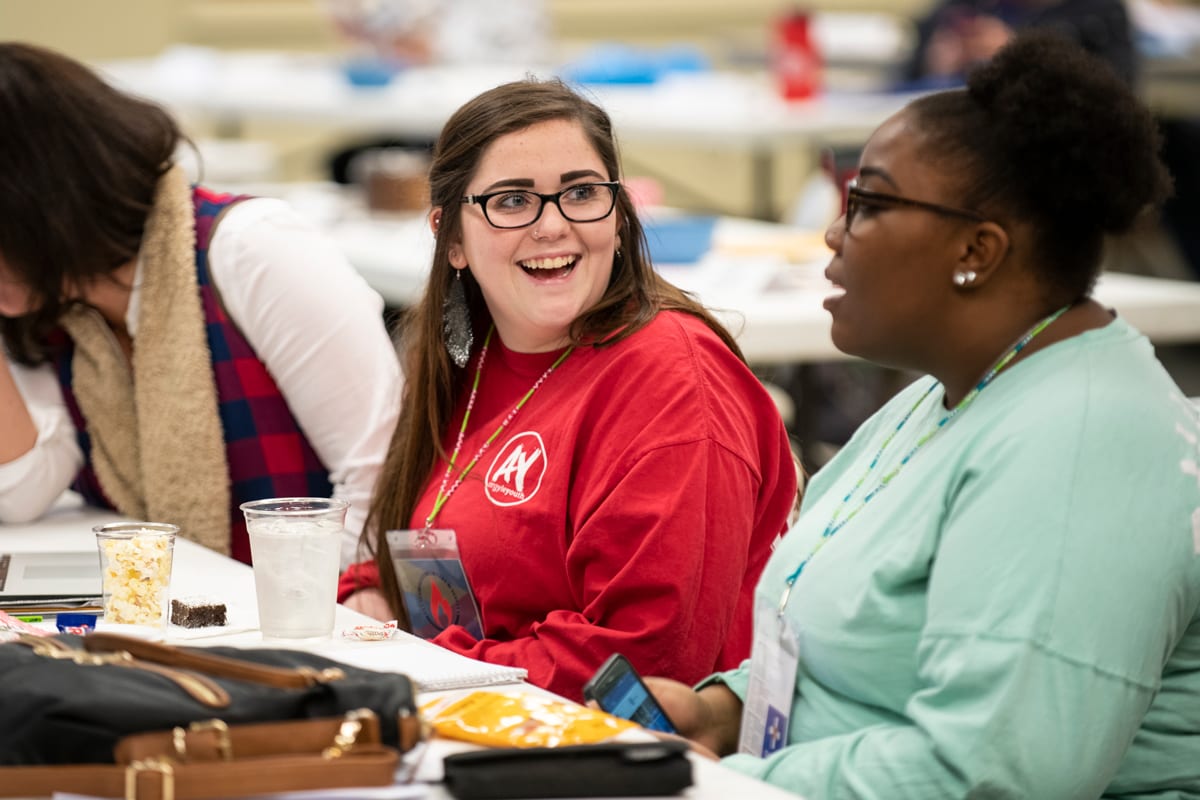By the time the Perkins youth ministry conference concluded, Rev. Elizabeth Murray had a newly crafted sermon in hand and a strategy for helping a shy young person at her church feel more connected to the youth group.
“I got much more than just theory,” said Murray, who is Youth Minister at Lexington United Methodist in Lexington, S.C. “I left the conference with a To Do list and some tangible ideas to use right away.”

Murray was one of about 175 youth ministers and workers from 11 states and seven annual conferences who traveled to Dallas for the annual Perkins School of Youth Ministry, held January 7-10 at Highland Park United Methodist Church.
With the theme “Breathe,” the gathering gave youth ministry staffers a place for fellowship as well as practical instruction.
“We have a core group of participants who come year after year,” said Bart Patton, the conference coordinator. “The conference has evolved into a community of learning, where people are excited to not only to grow, but also to be around a group of others who ‘get’ what they do.”
Participants chose from one of three options: Foundations Training covering ministry basics like curriculum, budgeting, organization, programming and safety; four workshops, each focusing on a key area (practice of youth ministry, theology of youth ministry, spiritual leadership in youth ministry and congregational youth ministry); or Youth Ministry Certification courses for those pursuing Certification in Youth Ministry through the General Board of Higher Education and Ministry of the UMC.
The Foundations course was ideal for Nautica Washington. She was just a week into her job as Communications & Youth Coordinator at Walnut Hill United Methodist Church in Dallas when the conference began.
“I learned behind-the-scenes things such as budgeting, planning mission trips and communicating with the church – other staff members as well as the congregation,” she said. “That’s allowing me to focus on what’s more important, which is helping youth grow in their faith.”
About 95 percent of conference participants come from United Methodist or pan-Methodist churches. Murray, who has attended other youth ministry conferences, appreciated that Wesleyan focus.
“Sometimes I have to kind of pick and choose from what I hear at other conferences, which may be more skewed to megachurches with hundreds of youth and large staffs,” she said. “At the Perkins event, you felt like everyone was on the same page. Everything I gleaned was relevant.”
Patton, who is Director of Youth and Young Adult Ministry Education at Perkins, says that, while the Dallas conference is the flagship, the conference program will also be offered in Houston in May and in Eastern Pennsylvania in November to make the curriculum available to more youth ministers. For 2020, conference leaders plan to offer an option for participants to self-submit topics for workshops they’d like to teach themselves.

“We’re listening to the leaders who are emerging from our own community,” he said. “It’s part of our commitment to be a true learning community.”
A key focus of this year’s conference was to encourage youth ministers to have the confidence and skills to involve the entire congregation in youth ministry, rather than viewing youth programs as separate.
“Some of our youth ministers feel alone, isolated and overwhelmed,” he said. “They’re tasked to do a job that was never designed to be done by one person. We’re moving away from models that emphasize entertainment and toward more sustainable models for spiritual formation and discipleship.”
“What I took away most was finding out that most other youth directors go through the same challenges that I do, even the ones who have been doing this for a while,” said Kaitlyn Jackson, Director of Youth Discipleship at St. Barnabas United Methodist in Arlington, Texas.
All of the participants interviewed for this story said they plan to return next year. Following the advice of course leaders, Washington set up a meeting with her church’s pastor immediately upon her return. One of the first items of business in that meeting was asking to make room in the budget for her to return to the conference next year.
“The conference showed me that I don’t have to do youth ministry on my own,” she said. “We’re a community with so many resources, and we can nurture and support one another.”
